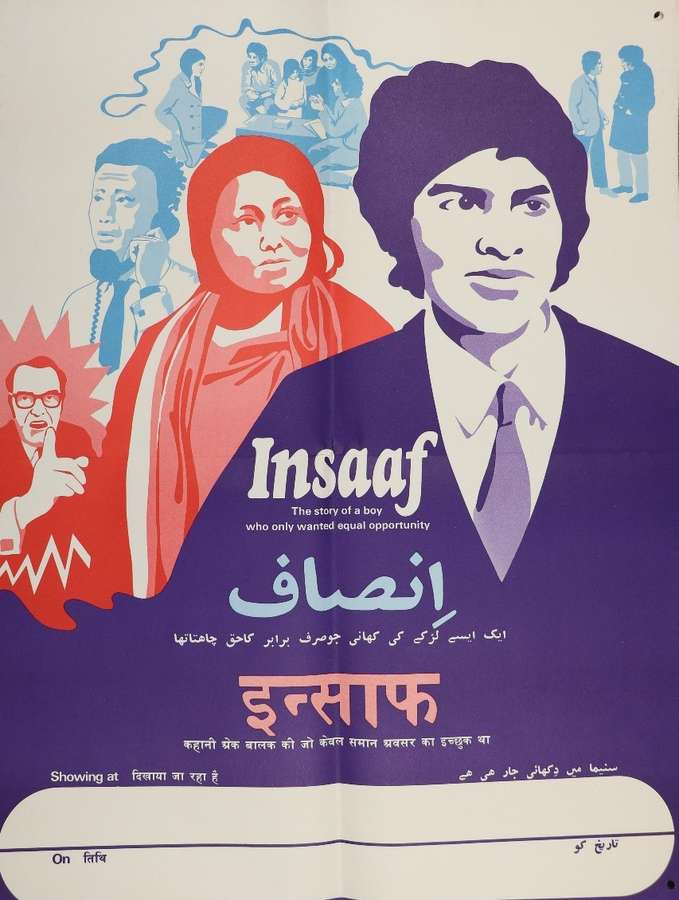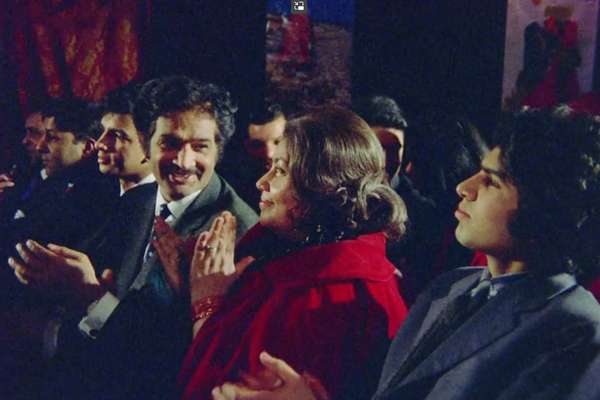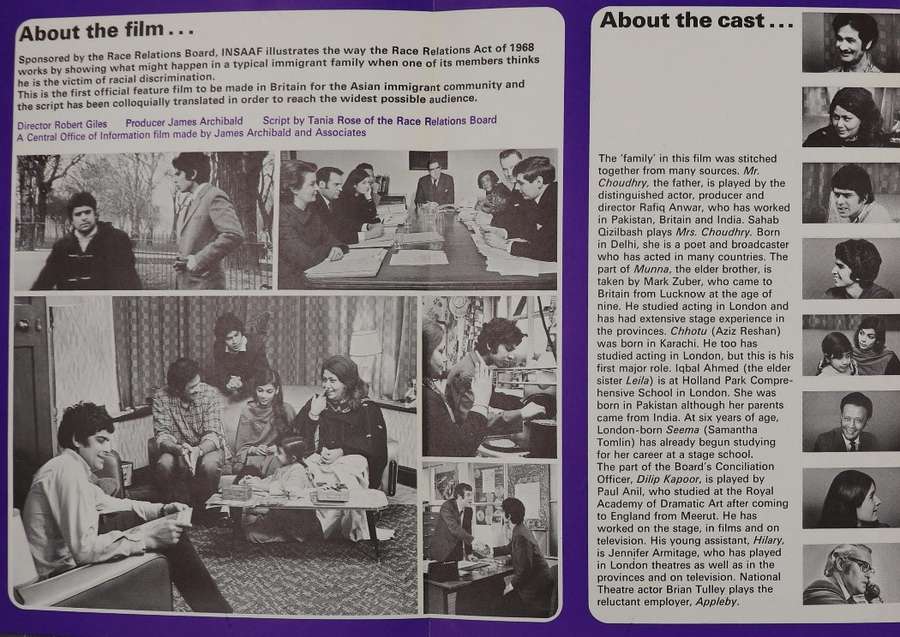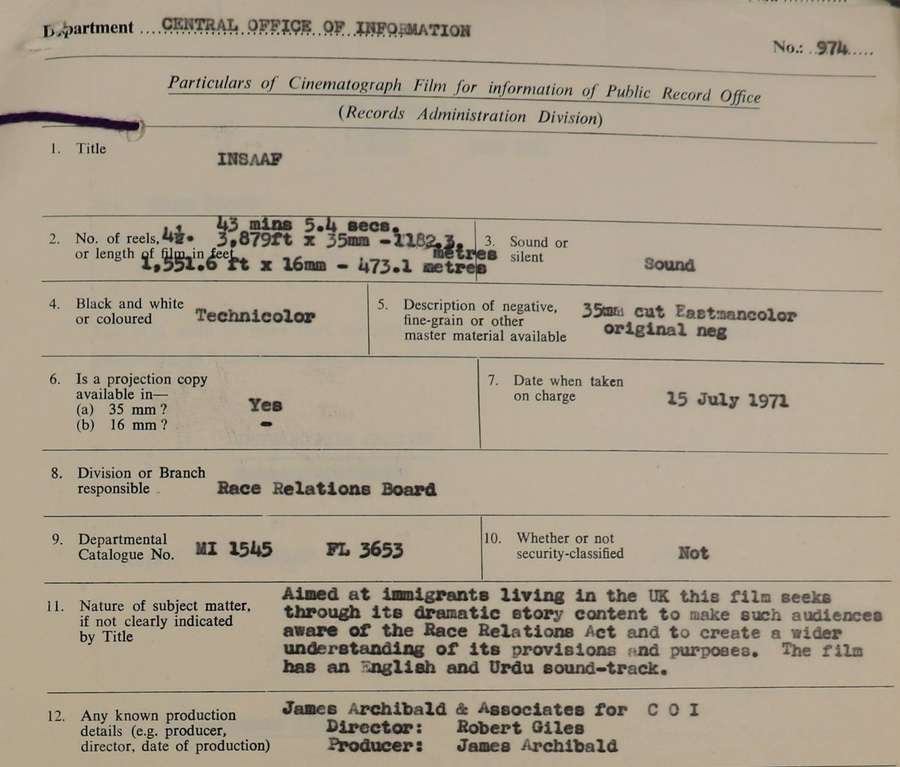The Central Office of Information
The National Archives has records from the Central Office of Information which made thousands of films to educate and inform the public about such issues as child safety, crime prevention and health.
Insaaf, which is the Urdu word for ‘fair play’ or ‘justice’, is the title of a 1971 film made by the Central Office of Information. It features actors Marc Zuber, Rafiq Anwar, Sahab Qizilbash and Aziz Resham among others.

A poster advertising the film Insaaf. Catalogue reference: INF 6/1584.
The film was targeted at the British South Asian community with the aim of raising awareness about the 1968 Race Relations Act. This Act made it illegal to refuse housing, employment, or public services to a person on the grounds of colour, race, ethnic or national origins.
Insaaf opens up a window on a particular cultural group – or a government portrayal of that group – at a particular time. It raises interesting questions about culture, language, representation and the history of South Asian communities in Britain.
player.bfi.org.uk
Watch Insaaf

While The National Archives does not hold the film itself, Insaaf is available to watch in full for free on the British Film Institute's BFI Player
Chhotu's story
The film is a 40-minute drama following the story of a 16-year-old British South Asian boy, given the affectionate nickname, Chhotu, by his family.
Chhotu is turned down for a job despite having an apparently successful interview, and this sparks a discussion with his family over dinner. His older brother, Munna, believes racism is an inevitable barrier, but his parents see education as a way to improve job prospects.

About the cast…
The ‘family' in this film was stitched together from many sources. Mr Choudhry, the father, is played by the distinguished actor Rafiq Anwar, who has worked in Pakistan, Britain and India. Sahab Qizilbash plays Mrs Choudhry. Born in Delhi, she is a poet and broadcaster who has acted in many countries. The part of Munna, the elder brother, is taken by Mark Zuber, who came to Britain from Lucknow at the age of nine. He studied acting in London and has extensive stage experience in the provinces. Chhotu (Asis Reshan) was born in Karachi. He too has studied acting in London, but this is his first major role. Iqbal Ahmed (the elder sister Leila) us at Holland Park Comprehensive school in London. She was born in Pakistan although her parents came from India. At six years of age, London-born Seema (Samantha Tomlin) has already begun studying for her career at stage school. The part of the Board’s Conciliation Officer, Dilip Kapoor, is played by Paul Anil, who studied at the Royal Academy of Dramatic Art after coming to England from Meerut. He has worked on the stage in films and on television. His young assistant, Hilary, is Jennifer Armitage, who has played in London theatres as well as in the provinces and on television. National Theatre actor Brian Tulley plays the reluctant employer, Appleby.
A leaflet promoting the film. Catalogue reference: INF 6/1584.
Chhotu contacts the Race Relations Board with his complaint, and a representative has discussions with the family. Later, at a committee meeting, it is agreed that the employer has discriminated against Chhotu.
The Race Relations Board representative contacts the employer and explains how he has failed to meet his responsibilities under the 1968 Race Relations Act. Subsequently, the employer agrees to pay a compensatory sum to Chhotu and to offer him a job with the company.
Making the film
The National Archives has the Central Office of Information’s file about the making of Insaaf. It includes a translation of the Urdu sections into English, letters about recruiting actors, comments about the initial storyline, and copies of publicity posters and leaflets.

Department CENTRAL OFFICE OF INFORMATION
Particulars of Cinematograph Film for information of Public Record Office (Records Administration Division)
1 Title: INSAAF
[…]
- Nature of subject matter, if not clearly indicated by Title: Aimed at immigrants living in the UK this film seeks through its dramatic story content to make such audiences aware of the Race Relations Act and to create a wider understanding of its provisions and purposes. The film has an English and Urdu sound-track.
This form captures the target audience and aims of the film. Catalogue reference: INF 6/1584.
-
- From our collection
- INF 6/1584
- Title
- The Central Office of Information’s file on Insaaf
- Date
- 1970–1972
Other films
The Central Office of Information made other films dealing with race relations and/or aimed at immigrant communities. You can watch some of them on BFI player, free of charge
player.bfi.org.uk
Moslems in Britain – Manchester (1961)
One of four films aimed at encouraging people from Arabic-speaking counties to come and work in Britain in the 1960s. The title uses a spelling common at the time but which is now considered outdated.
player.bfi.org.uk
The Referee (1976)
This short film aimed at Britain's South-Asian community uses wrestling as a metaphor for race relations.
player.bfi.org.uk
Uganda Asians (1972)
President Idi Amin's expulsion of Uganda's South Asian-descended population meant a generation facing exile. This film asked how Britain would respond to the plight of thousands of refugees.






